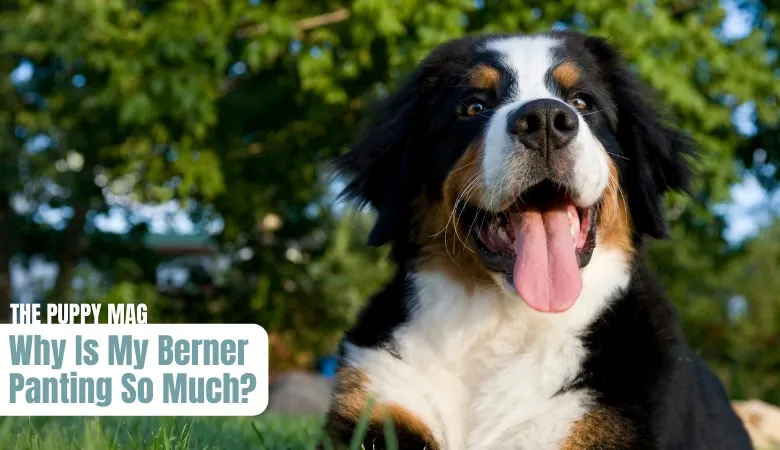Watching your Bernese Mountain Dog continuously pant can be very worrying. Although most of the time, heavy breathing can be explained easily, it still helps to know what’s normal and what isn’t.
This article explains everything and has been verified by a qualified veterinarian.

Table of Contents
Bernese Mountain Dogs & Heavy Panting
Being too hot and exercise, explains most heavy panting seen in Bernese Mountain Dogs. Panting is a way for your Berner to cool down and calm down. In rare situations, it could indicate an underlying health problem.
Panting, for the most part, is a natural response that happens when dogs become too hot. Panting is one of the primary ways they can cool themselves down. Source
There are also less obvious times when dogs pant, yet would still be considered normal. So let’s take a look.
Additional (and normal) reasons why your Bernese Mountain Dog is panting
● After exercising
● In hot weather/temperature
● After playing
● When traveling in the car
● When meeting new people, or new dogs
● After getting particularly excited for any reason
● In response to unfamiliar events like loud noises, getting startled, fireworks, and anything unusual
As you can see, there are many situations when panting is in fact normal.
So the next time you spot your Berner panting, remember the list above; perhaps he’s just been for a car journey? or a friend has just come around your house. Panting isn’t always caused by exercising.

Psst! A quick word on training. So many owners are praising Brain Training For Dogs we’ve got to mention it. Owners are reporting improved obedience and behavior quicker than anything else they’ve tried. We highly recommend checking it out.
Bernedoodles & Panting:
As a side note here, many of our readers also own Bernedoodles. And the information is essentially the same. Bernedoodles are very large and have a similar physical makeup as a Bernese Mountain Dog.
If you own a Bernedoodle that’s panting, all of the information throughout this article will be relevant too!
When Panting Is a Sign Of Something Worse
As there are many moments when panting is considered normal, how can you tell when there’s something wrong?
It’s a matter of using common sense to determine whether your Berner is panting for a good reason and if it fits the situation.
If it is not a hot day, sunny, your Berner hasn’t recently exercised, and nothing out of the ordinary has happened, your Berner shouldn’t need to pant.
1. Stress & Anxiety
General stress and anxiety can be brought on by a range of different things. Anything from a lack of exercise, spending too much time alone, boredom, and events like moving house or a change in your daily routine can bring on stress in your dog.
As stress is such a broad topic and can be caused by many different things, it can be hard to identify as the cause. Have a think about your Berners routine, life, and consider whether or not he has anything to be stressed about.
Panting when out of context, could be a sign that your Berner is overly stressed or anxious.
2. Allergies and Health Issues
In the worst cases (rare) your Berner could be panting due to a health problem that has yet to be discovered.
Certain health issues like Cushing’s disease, heart disease, or pulmonary disease cause dogs to pant excessively.
Although it’s rare for this to be the case, it’s always best to be cautious. So if you see your Berner panting a little too much when it doesn’t seem right, you should contact a veterinarian and explain the situation.
3. Heatstroke and Dehydration
You may be thinking, well isn’t this just overheating? How would I know if the panting is heatstroke or just because it’s summer?
Good questions. Fortunately, there are extra signs to see if your Bernese Mountain Dog is suffering from heatstroke or dehydration.
Both of these are serious issues and you need to address them right away.
If you notice your Berner’s tongue to be bright red, or that his saliva is getting very thick and sticky, he may be experiencing dehydration. You may also witness him struggling to move, get up and he’ll appear very weak. He may also vomit or experience diarrhea. These are all signs of heatstroke and/or dehydration.
So if the panting is coupled with any of those symptoms, you must call your veterinarian for further guidance.
Related: How To Keep a Bernese Mountain Dog Cool in Summer
Spotting Excessive Panting
The best way to help your Berner is simply to be aware.
- Unfortunately, there isn’t a set number of pants you can count that will determine whether there’s something wrong or not.
Whenever you see your Bernese Mountain Dog panting, take a second to think whether it fits the situation and recent events leading up to now.
If it’s the middle of winter, cold, your household is quiet, and your Berner hasn’t been exercising, there’s likely no good reason to start panting, so in this situation, it would be advised to call a veterinarian.
It’s all about analyzing the situation and asking yourself if it makes sense to be panting. It helps to go back over the list of the normal scenarios you can expect panting to happen.
What Should You Do In The Moment
If you do suspect that something isn’t quite right, the very best course of action is to phone your veterinarian.
By giving them a call you will receive some guidance immediately over the phone and it’s likely they will ask you to bring him in, or at least schedule an appointment.
If it’s a hot summer day, encourage your Berner to stay in the shade and always provide cool, fresh water for him to drink at all times. Ideally, he’ll have access to a room with a tiled floor, air conditioning, or at least some fans.
For other moments when you suspect excessive panting, it’s all about helping your Berner to calm down and feel relaxed. Talk in a calm, reassuring voice, ensure he has access to fresh water, and be wary of anything else that may cause further nerves.
The Link Between Panting and Their Coat?
Bernese Mountain Dogs have thick double coats, and still to this day, owners that are unaware grab the clippers and shave off their coat “to keep them cool”.
This is the WORST thing to do to help keep any double-coated breed cool. In fact, it will do the opposite and cause them to be hotter.
I say this because panting is most of the time caused by being too hot and it’s natural for us to want to help our dogs become cool again. But do not go near their coat!
Bernese Mountain Dog Articles:
How Often Should You Bathe a Bernese Mountain Dog
Can Bernese Mountain Dogs Live Outside
Can Bernese Mountain Dogs Be Left Alone?
Back to more Bernese Mountain Dog articles >>
Last Thoughts
For the most part, panting is a normal response that your Bernese Mountain Dog will have for many situations.
Usually, it’s to cool down, but it can also happen in various other situations. Be sure to revise the list above to know when it is appropriate to pant, and when it isn’t appropriate to pant.
Whenever you see your Berner panting, don’t ignore it. Take a second to stop and think about whether it fits the situation. If you are even remotely concerned, contact your veterinarian to be on the safe side.
Most Recommended For Bernese Mountain Dogs
Best Brushes For Shedding
No matter how much you brush your Berner, if you aren’t using the correct brushes, you won’t be getting the most out of every session! A simple Undercoat Rake and a Slicker Brush are by far, the two best brushes to deal with shedding.
Best Online Training Program
Brain Training For Dogs has become increasingly popular with working dogs in the last few years and is now recognized as one of the best ways to train dogs in the most stress-free, positive way.
Best Low-Calorie Treats
Avoid weight issues with your Berner by switching out the high-calorie treats and opting for something healthier. Zuke’s Mini Naturals contain only 2 calories per treat and are made from natural ingredients, making these some of the healthiest treats on the market.
